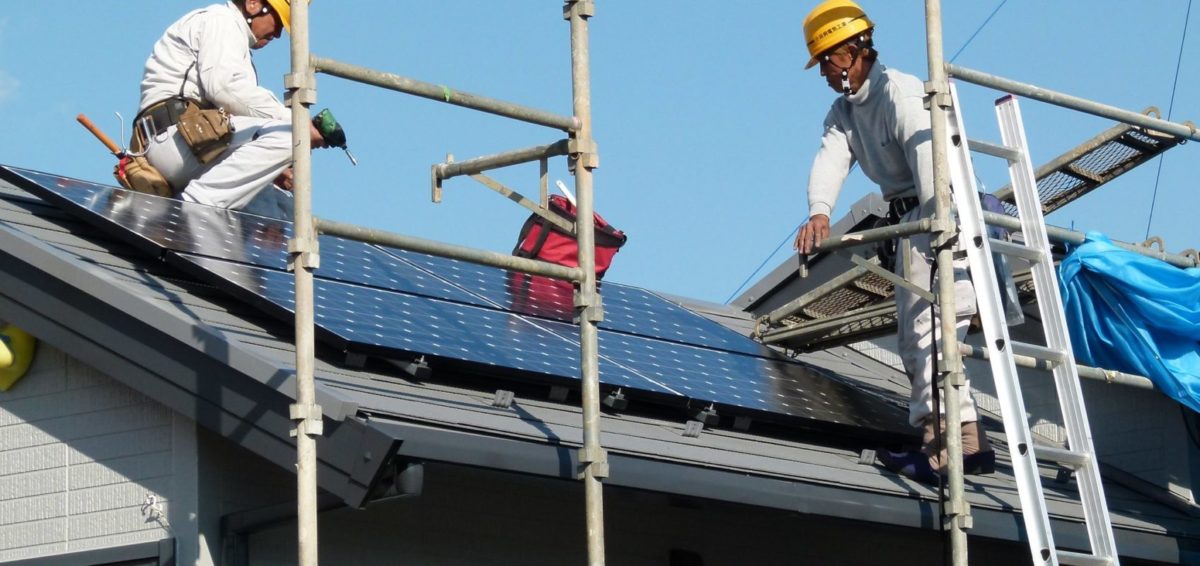 A solar power system is installed on a residential rooftop. (Courtesy: Flckr Creative Commons)
A solar power system is installed on a residential rooftop. (Courtesy: Flckr Creative Commons)Five years after it was first proposed, Massachusetts’ Cape Light Compact (CLC) is celebrating the long-awaited and hard-won regulatory approval of a first-in-the-nation energy storage pilot program for low-income customers. But in a strange twist, the Dept. of Public Utilities simultaneously approved the pilot offering, while banning any similar proposals for the near future.
The Cape & Vineyard Electrification Offering (CVEO) sets a new precedent for utilities across Massachusetts by offering free batteries, solar PV, and heat pumps to income-eligible customers. And as the only customer battery equity offering in Massachusetts, the CVEO demonstrates that state energy efficiency budgets can be used to cost-effectively provide free battery storage to low-income customers.
The pilot program will be implemented over the coming year, targeting 100 households in Cape Cod, Martha’s Vineyard, and Duke County. Eighty of these households will be below the 60% Area Median Income (AMI) threshold, and twenty will be between 60-80% AMI. The low-income (LI) households will receive rooftop solar and heat pumps completely free of charge while the median-income (MI) households will be required to pay 20% of the costs. They will also have access to HEAT loans that provide interest-free financing.
Of these 100 households, twenty-five will also receive battery storage. Low-income customers will receive two batteries for free, while MI customers will receive a $15,000 incentive for their battery systems (and access to HEAT loans to help cover remaining costs). The reasoning behind providing two batteries to LI households is that the additional storage capacity will enable them to run their heat pumps in the event of a power outage. This is similar to Green Mountain Power’s Resilient Home program, which also provides two batteries to participating residential customers to create a whole-house resilient system.
Households receiving battery storage under the CVEO will be automatically enrolled in Massachusetts’ ConnectedSolutions program, but will not receive additional payments through ConnectedSolutions to avoid “double-dipping.” ConnectedSolutions performance payments will instead be paid back to CLC to offset program costs.
To be eligible for the program, CLC customers must not only meet income qualifications; they must also have participated in an energy efficiency audit within the past two years, and have implemented all recommended efficiency upgrades, including replacing fossil fuel appliances. Essentially, eligible customers will have fully decarbonized homes.

DPU approval of this innovative program was a long time coming. Cape Light Compact had submitted three previous versions of the program since 2018 before finally gaining regulatory approval for this fourth (considerably scaled-down) version, and the DPU likely only granted approval due to the passage of the Massachusetts 2022 Clean Energy Act (officially titled An Act Driving Clean Energy and Offshore Wind). Section 87A of the act authorizes an electric energy efficiency Program Administrator to submit to the DPU “proposed low- and moderate-income whole building efficiency, electrification and greenhouse gas emissions reduction offerings to a limited number of participants within the low- and moderate-income customer groups.” In its order approving the CVEO, the DPU cited Section 87A numerous times.
Nevertheless, the DPU found the pilot program to be “in the best interest of ratepayers” and stated that “the benefits of the proposed demonstration project justify the cost to both participating and non-participating customers.” This means providing free battery storage, solar PV, and heat pumps to LMI households is a positive investment for Massachusetts ratepayers. Benefits include higher energy efficiencies, increased renewable usage and decreased fossil fuel usage, reduced electricity costs across the state due to lowered peak demand, increased climate resilience, and improved indoor air quality. The program will also help the Commonwealth meet its energy equity and decarbonization goals.
Approval of the CVEO creates a significant precedent that should be followed by other utilities across Massachusetts. Unfortunately, the approval came with a DPU prohibition on any similar programs being proposed for five years, or until results of the CVEO pilot can be assessed. It appears that income-eligible customers outside of Cape Cod may have to wait a while for a similar equity offering… unless, of course, a court should overturn the DPU’s ban on replicating a program it has already deemed beneficial and cost-effective.
Regardless of whether the DPU’s ban stands, the other Massachusetts utilities should now be developing their own income-eligible battery proposals. And of course, the Massachusetts DPU’s oddly restrictive ruling doesn’t have any bearing on other states. Just as Connecticut has expanded and improved upon the ConnectedSolutions model – first implemented in Massachusetts – with its Energy Storage Solutions program, so too should other states be paying close attention to Cape Light Compact’s innovative low-income electrification offering.